Call Us What We Carry (6 page)
Read Call Us What We Carry Online
Authors: Amanda Gorman

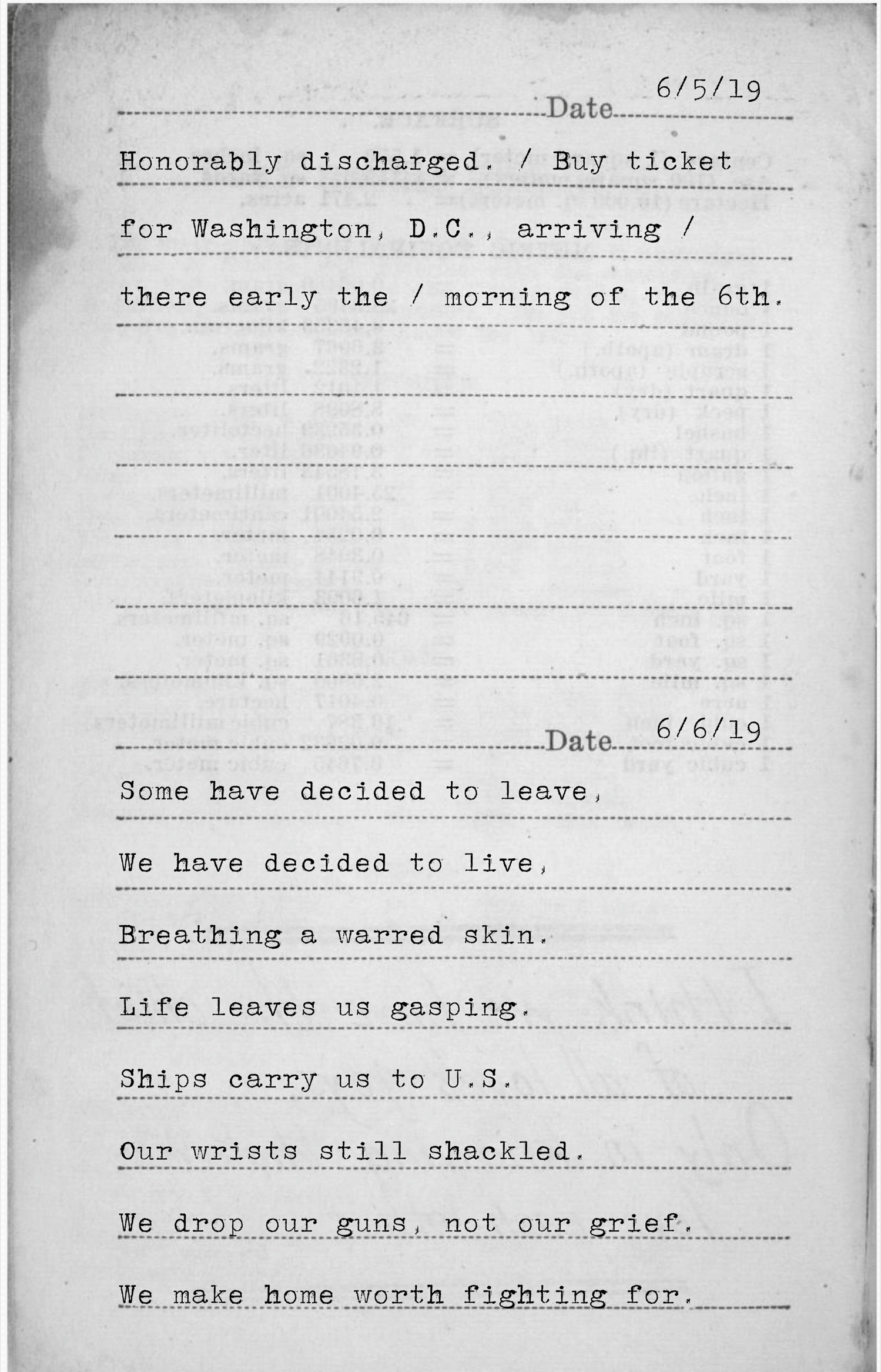
To view as reflowable text, see
this page
The prose portions are his original diary entries, while the verses are my own creation, where I imagine new writings. In writing in Corporal Plummer’s voice, I wanted to do so in a form that embodied his concise language. The lined papers used as a journal background in this piece
are scans of blank pages in Plummer’s original diaries. The haiku was particularly fitting—many of Plummer’s entries are one to three sentences, & the haiku is three lines, their five-seven-five syllable pattern demanding an economic use of language.
.-- .- .-. / .-- .... .- - / .. ... / .. - / --. --- --- -..
How much toilet paper,
Hand sanitizer,
Were we allowed?
In battle, everything,
Even hope, is rare & rationed,
Creating competitors from comrades,
Making monsters of men.
This mask is our medal of honor.
It has our war written all over it.
The 1918 influenza killed 50 million people (though some scholars suggest it could be 100 million), far more than those killed in World War I. The death toll of the influenza was intrinsically tied to warfare. The movement of large numbers of troops across the continents contributed to the spread of the virus; meanwhile millions of noncombatants were uprooted from their homes. The influenza was particularly devastating to Indigenous communities, which had already barely survived ethnic
cleansing campaigns. No matter what we’re told, violence is never little.
War, like a whale, is all consuming—
Everything fits into its mesh mouth.
Like a whale, a virus can wolf
Down the globe whole.
The bullet is a beast, as are we.
Our invisible battles
Are the hardest ones to win.
The first step in warfare & pandemics is the same:
Isolation, to rupture the channels of communication of virus/violence.
The British pioneered cable cutting during WWI, using the CS
Alert
to dredge Germany’s underwater telegraph cables. Wartime censorship also slashed communication & truth-telling; the US Sedition Act of 1918 outlawed speech or expression that damaged the country’s image or war effort. Fearing punishment, newspapers minimized the threat of the virus, often refusing to print doctors’ letters warning the public not to gather or travel. This
censorship & misinformation only contributed to the further communication of influenza across the country & globe. Fire barrel of the throat. Words, too, are a type of combat, for we always become what we refuse to say.
After we fight
Someone we love,
We offer a question:
Are we okay?
Are we good?
The First World War was once called “Great,”
So named “The War to End All Wars.”
Ha.
What is called “great”
Is often grievous & gruesome,
But what is good is worth our words.
Good trouble.
Good fight.
Good will.
Good people.
To be good is to be larger than war.
It is to be more than great.
The body is a walking
Chaos of meat & bones.
Deaths & injuries in armed conflicts
Are called casualties,
casual
meaning
“By chance” or “accident.”
But bloodshed in war is no misfire.
Perhaps
casualty
means that war itself
Is the accident, unmistakably a mistake,
Our big, fat, bloody
oops!
The second step in warfare & pandemics
Is the same: continuation,
To uphold remaining modes of connection & communication. Writing letters to the home front was encouraged among WWI service personnel & volunteers abroad so as to raise national morale. The British Army Postal Service delivered around 2 billion letters during their involvement in the conflict. In the US, 1917’s General Orders No. 48 stated that “Soldiers, sailors, and marines assigned to duty in foreign countries are entitled to mail letters ‘free’ ” . . . by marking on the envelopes On
Active Service . . . During the war, A. E. F. Camp Crane in Allentown, Pennsylvania, reported its post office handling nearly 70,000 pieces of mail per week. The home front is a pen. Pen us in. We swear we can be good.
Listen closely.
Are you listening?
There is no such thing as gentle war.
There is no peace
That can’t be flung aside.
Our only enemy is that which would
Make us enemies to each other.
Snail mail?
More like whale mail.
It is the only thing
With a mouth wide enough to speak
When we have nothing left
To say. All this to say,
Writing our stories
Is an essential service.
It is how we go to war.
Most importantly,
It is how we end it.
We’re still willing to believe
Peace is a place on earth.
A century past World War I, condolence cards sold out in 2020. A majority of United States Postal Service users agree that receiving letters raises their spirits & one in six send more mail now during the pandemic. In pandemics, everything is scarce except for grief. Writing, truth-telling to one another, is an act of hope-making when hope is hardest found. What place have we in our histories except the present.
Aperture:
The hole in the eye
Through which light travels.
The word
peace
shares history
With
pact
. That is to say, harmony
Is a tomorrow we agree on.
We’re more conditioned
To contagion than combat.
But a virus, just like a war, separates us
From our fellow people.
Yet if we are willing, the cut
Can be an aperture, the hole
Through which we reach for the whole
Of one another.
A virus is fought inside us,
While violence is fought amongst us.
In both, our triumph is not in conquering others,
But conquering the most destructive agents
& instincts that we carry
Within our mortal forms.
Hate is a virus.
A virus demands a body.
What we mean is:
Hate only survives when hosted in humans.
If we are to give it anything,
Let it be our sorrow
& never our skin.
To love just may be
The fight of our lives.
THE FELLOWSHIP
B Well
The ship calls you man. Bullet, refrain from going into public places. Service is putting good to all civil rights, causes, nations, our form. O order so vicious has been issued in many. Democracy before war.
B Well
§§
§§
April 1918 letter from Mrs. Ida B. Wells-Barnett, President of the Negro Fellowship League, to United States President Woodrow Wilson. In the letter she protests General Ballou’s Bulletin Number 35 for the 92nd Division, Camp Funston, Kansas, which urged officers & soldiers of color against entering public places where they were unwanted due to their race. National Archives.
_Â _ Â A Â _Â _Â _Â _Â _ Â SHIP
Fig
. I
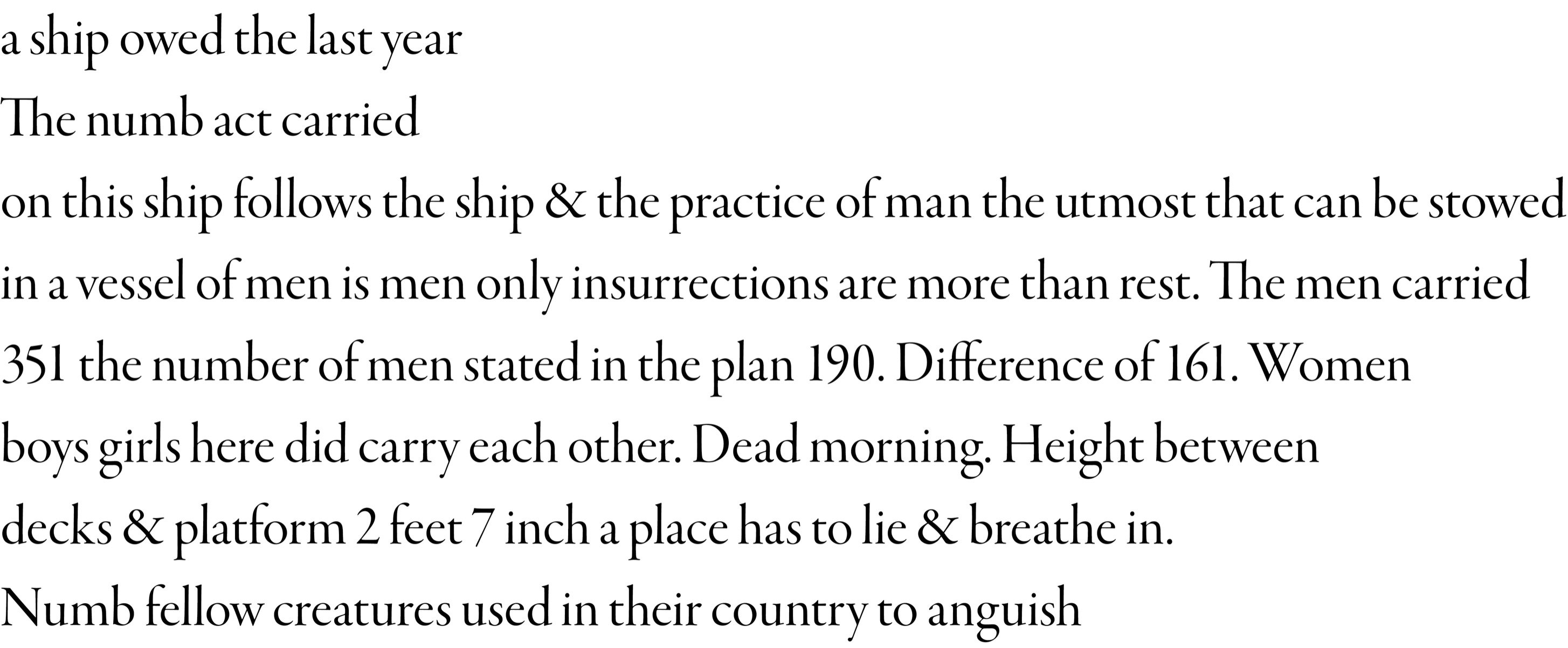
To view as reflowable text, see
this page
. III
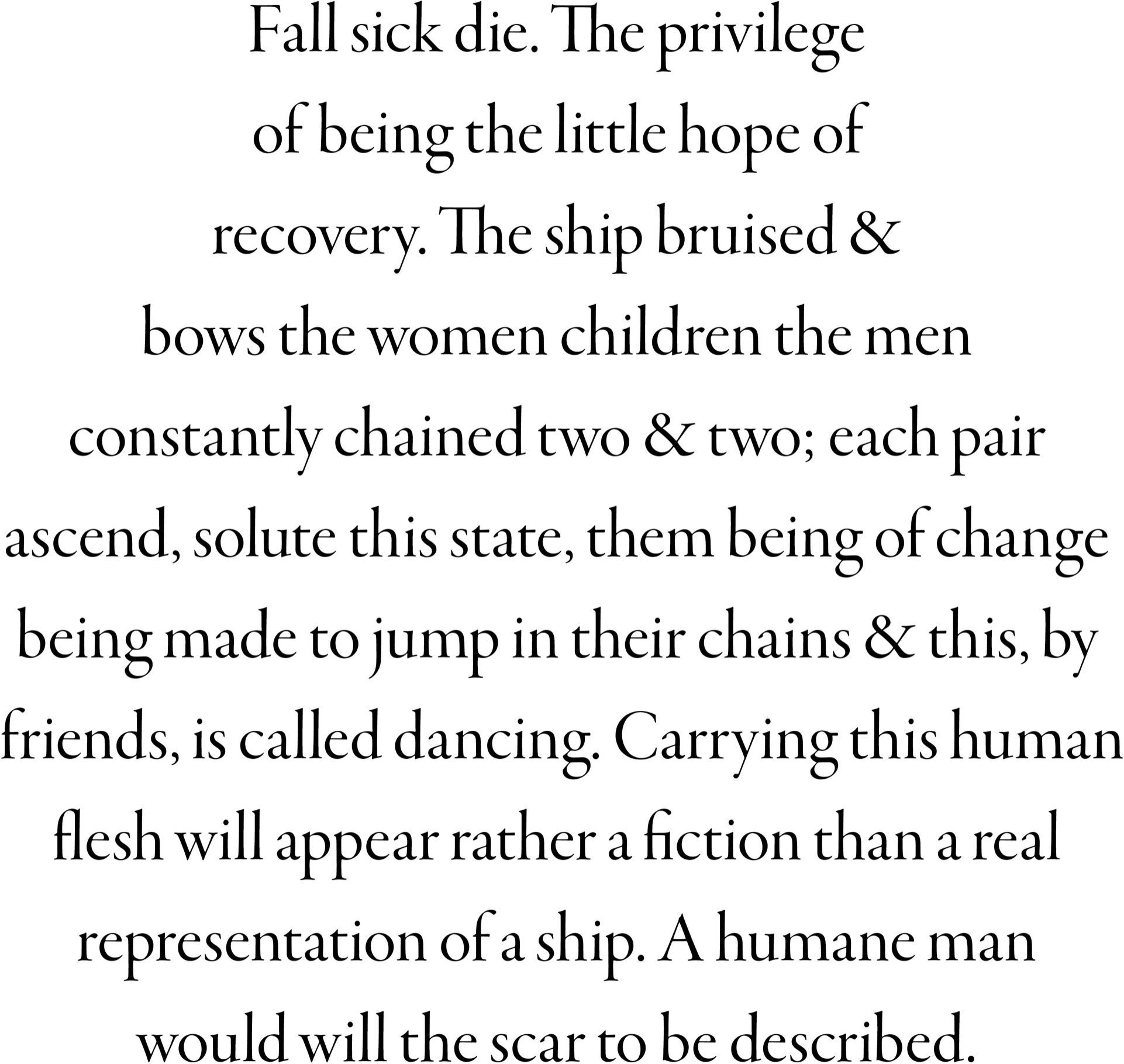
To view as reflowable text, see
this page
VII
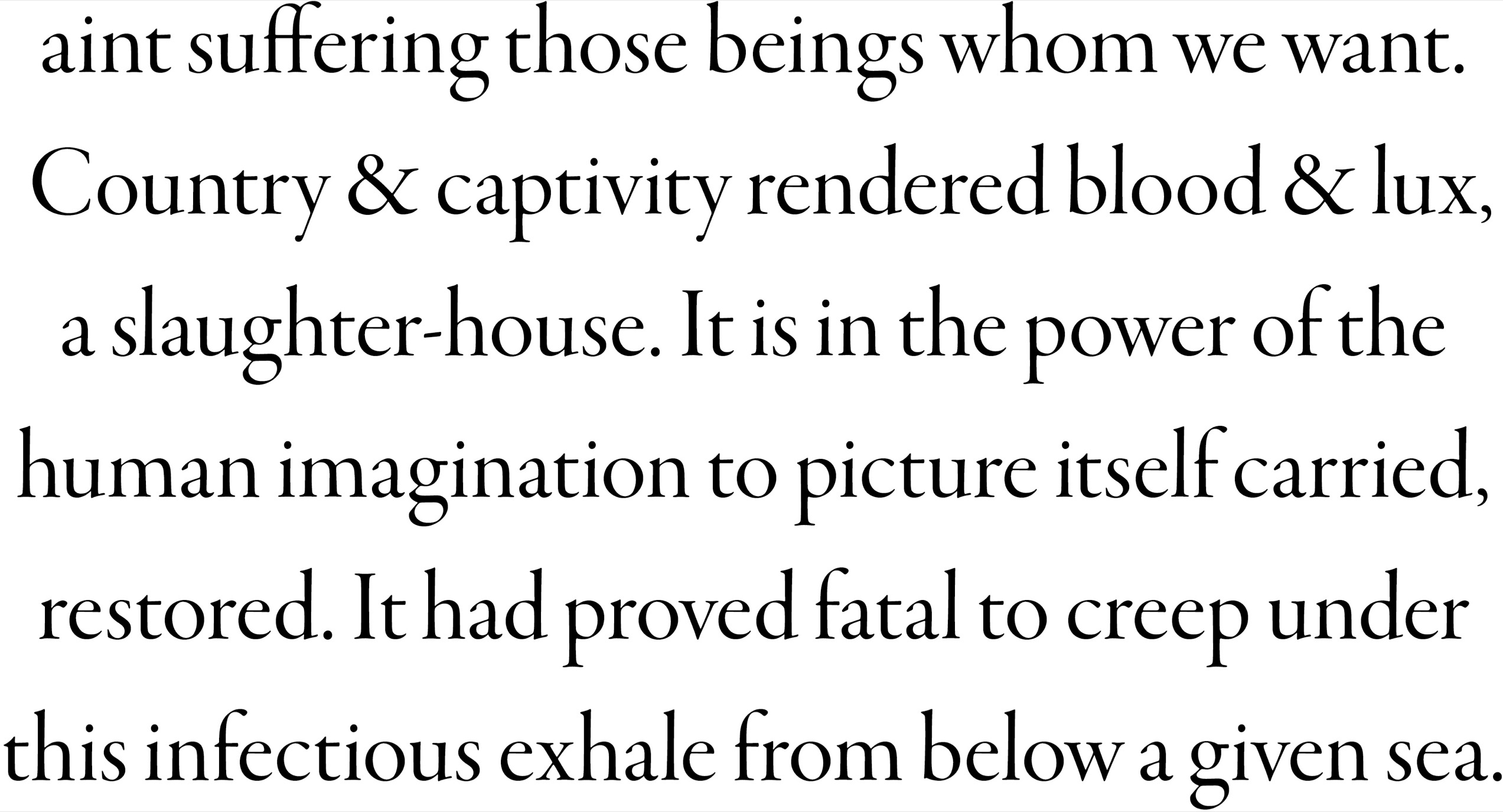
To view as reflowable text, see
this page
V
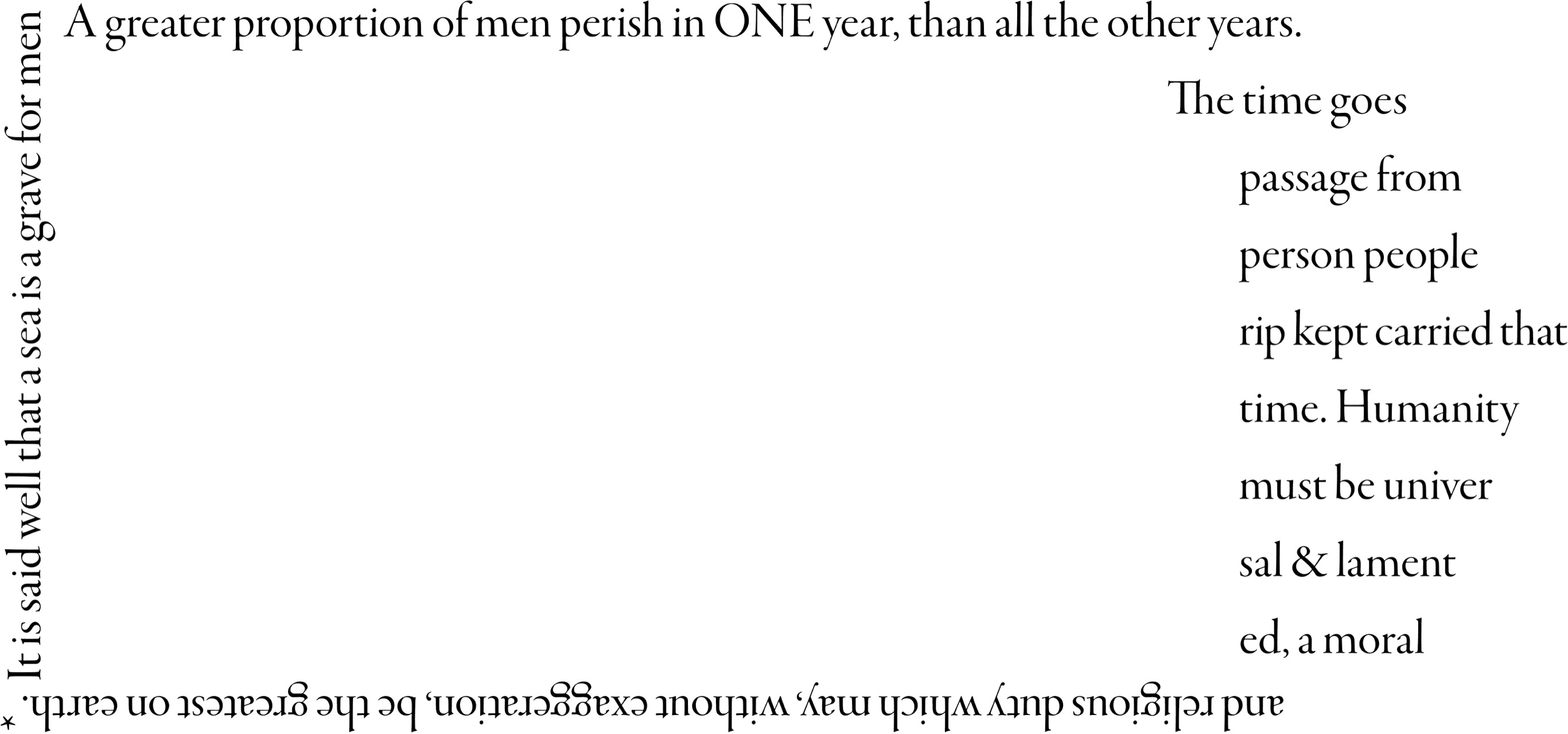
To view as reflowable text, see
this page
*
Description of a Slave Ship
. London: Printed by James Phillips [for the London Committee of the Society for Effecting the Abolition of the Slave Trade], 1789. Two broadsides. This is perhaps the best-known depiction of a slave ship. Its images of enslaved Africans packed like sardines is most recognizable, while the narrative description printed below it, which is just as harrowing, rarely receives the same attention.
Learn those lives touched
No one would touch you anymore, you said
Your friends had become afraid & could not hold you close.
The word is not in my vocabulary
Afraid
is absent from our vocabulary
Is fate because of fear
We’ll never know.
You know, don’t you,
Even those you never knew remember you.
We will do our best to see
That no one will have to live without love
Know what it is like to be shunned
By nurses & friends, hospital employees
Refusing to come into your room
& when they did, they were covered in plastic gloves
& smocks.
Please take the pieces
Please forgive us for getting carried away.
We did it for two reasons—
For all who’ve been lost
& all who’ve lost them.
Fathers, grandparents, sisters, brothers,
Sons, daughters, nieces, nephews, lovers & friends
So good.
We could change things
We could stop the epidemic
We could save you
In the end, of course, we could not
Speak those names found by humanity.
Now
cannot put love into the past tense
Above all, love—love very much.
If love could cure!
Each day slowly could not breathe.
Life still lives.
Our memories are you.
Remember this loving
Was dying.
Distort body
Breathing difficult
Lonesomeness is a never-ending ache.
We were barred from seeing
To see to mourn
We tried to forget.
We just can’t let go yet
Hang on
Remember clearly
The best way is with poems
Remember
We were beginning
Dancing true
New meaning
New hope
We have held this hope with the rest.
We stood & did not see death.
Do you see
From the world to whatever awaits.
¶¶
¶¶
This documentary poem was made using the letters of contributors to the AIDS Memorial Quilt, each hand-sewn panel of which pays tribute to those who died from the disease. First displayed in 1987, the Quilt is now part of the National AIDS Memorial. As of 2021, it spans 1.2 million square feet & includes more than 48,000 panels. According to UNAIDS, 27.2 to 47.8 million people have died from AIDS-related illnesses globally since the start of the AIDS pandemic.